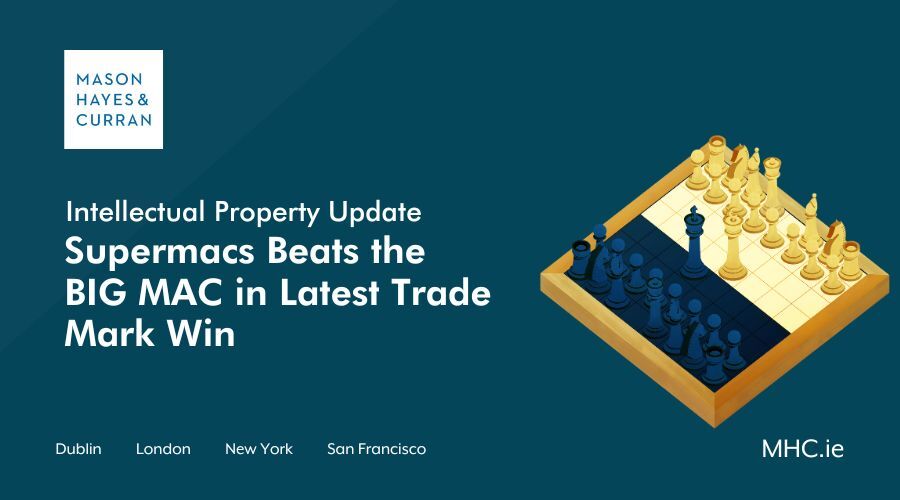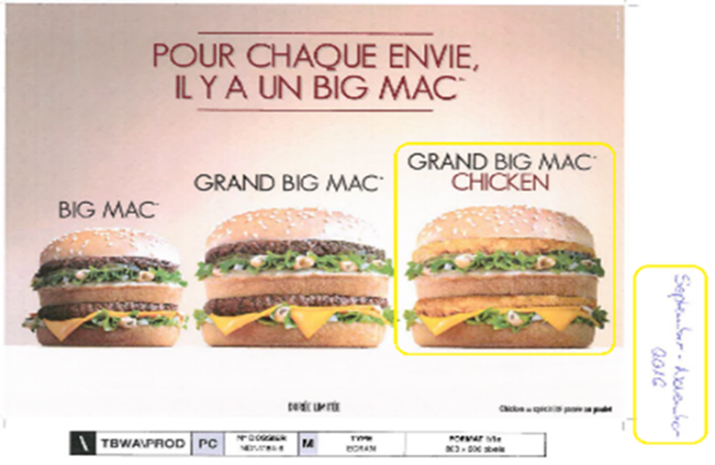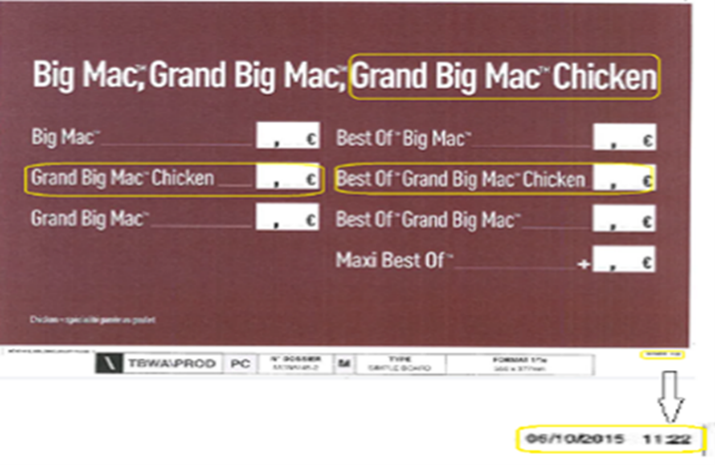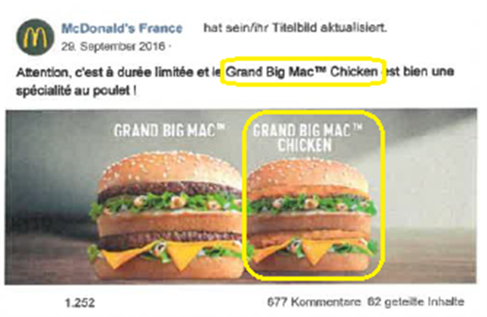Supermacs Beats the BIG MAC in Latest Trade Mark Win

The burger wars continue! The General Court of the EU has recently ruled in favour of Supermacs in its ongoing legal battle with McDonald’s over the BIG MAC EU trade mark. The BIG MAC no longer protects ‘chicken sandwiches.’ Our Intellectual Property team reviews the General Court decision and the takeaway for brand owners.
The General Court of the EU has recently weighed in on the ongoing Supermacs v McDonalds fight over the BIG MAC EU trade mark (EUTM). The EUIPO Board of Appeal found, in March 2023, that McDonalds had established genuine use of its BIG MAC EUTM for at least some of the goods and services it had been registered for. This finding was reported in our previous article. However, the General Court of the EU has now reversed that decision. The Court has found in favour of the Irish fast food chain. We review the latest update in this long running dispute . In addition, we look at its impact for trade mark owners in the food and beverage sector.
Background
Supermacs filed a revocation application against the BIG MAC EUTM in April 2017. This trade mark had been registered since December 1998. The EUIPO Cancellation Division agreed with Supermacs, and revoked the BIG MAC EUTM for all of the goods protected including:
- “Meat sandwiches” in Class 29
- “Chicken sandwiches” in Class 30, and
- “Services rendered or associated with operating and franchising restaurants and other establishments or facilities engaged in providing food and drink prepared for consumption and for drive-through facilities” in Class 42
The Cancellation Division held that the evidence of use provided by McDonalds did not prove the extent of use of the BIG MAC mark. McDonalds appealed and the EUIPO Board of Appeal annulled the decision of the Cancellation Division. This annulment applied to the revocation of the BIG MAC EUTM for other goods and services, “Foods prepared from meat and poultry products, meat sandwiches, chicken sandwiches, and edible sandwiches.”
Supermacs appeal
Supermacs appealed to the EU General Court. It accepted that McDonalds had provided use of the BIG MAC EUTM on ‘meat sandwiches’ in Class 30. However, it argued that the Board of Appeal decision should be annulled for all other goods and services protected by the mark. The key arguments made by Supermacs and which were successful before the General Court were the following:
There has not been genuine use of the ‘BIG MAC’ in connection with chicken sandwiches
Supermacs argued that the evidence produced by McDonalds was insufficient to substantiate genuine use of BIG MAC in connection with ‘chicken sandwiches.’ Before the EUIPO, McDonalds had relied on the following printouts of advertising posters, on which, the handwritten words ‘September – November 2016’ appear and menu boards relating to the ‘Grand Big Mac Chicken.’


It also relied on screenshots of a television commercial relating to ‘BIG MAC + Grand BIG MAC Chicken’. This commercial was broadcast in France in 2016. In addition, it relied on screenshots from the Facebook account of McDonalds France, relating to the offer of ‘Grand Big Mac Chicken’ in 2016, as depicted below.

The General Court concluded that this evidence does show ‘chicken sandwiches’ represented under the BIG MAC in the context of advertisements in France during the relevant period. However, it did not provide any indication of the extent of use of the mark in connection with those goods. In particular, it lacked information regarding:
- The volume of sales
- The length of the period during which the mark was used, and
- The frequency of use
For those reasons, the General Court concluded that the EUIPO Board of Appeal was incorrect. The evidence provided by McDonalds was sufficient to prove genuine use of BIG MAC on chicken sandwiches in France from 2015 to 2016.
The Board of Appeal incorrectly interpreted ‘fast food restaurant services’
The BIG MAC EUTM was registered by McDonalds for ‘services rendered or associated with operating restaurants and other establishments or facilities engaged in providing food and drink prepared for consumption and for drive-through facilities; preparation of carry-out foods.’ The Board of Appeal had interpreted these as being (fast food) restaurant services. By doing so, the General Court held that the Board made an error of assessment which impaired the decision as regards the existence of genuine use of BIG MAC in connection with those services.
There has not been genuine use of BIG MAC in connection with the services concerned
Even if the services protected were understood to be fast food restaurant services, the General Court was satisfied that none of the evidence provided by McDonalds referred to those services. On the contrary, there was no solid and objective evidence of actual use of BIG MAC in connection with ‘services rendered or associated with operating restaurants and other establishments or facilities engaged in providing food and drink prepared for consumption and for drive-through facilities; preparation of carry-out foods.’
In light of the foregoing, the General Court partially annulled the EUIPO Board of Appeal decision and found in favour of Supermacs. The BIG MAC EUTM has now been revoked for:
- ‘Chicken sandwiches’ in Classes 29 and 30
- ‘Foods prepared from poultry products’ in Class 29, and
- ‘Services rendered or associated with operating restaurants and other establishments or facilities engaged in providing food and drink prepared for consumption and for drive-through facilities; preparation of carry-out foods’ in Class 42.
Comment
McDonalds may decide to appeal the decision to the EU’s top Court, the Court of Justice. There would be no further appeal available to either party after that if the Court of Justice does rule on the case. In the meantime, the General Court decision represents a major win for Supermacs. The key takeaway for brand owners is the importance of collecting and maintaining appropriate evidence of use of registered trade marks. This will help avoid costly and lengthy legal challenges by competitors.
The General Court was very clear in its assertion that the use of a trade mark cannot be proved by means of probabilities or presumptions. Rather, it must be demonstrated by “solid and objective evidence of actual and sufficient use” of the trade mark on the market concerned. As can be seen via the difficulties faced by McDonalds and the BIG MAC, this is not necessarily an easy test to meet.
For more information and expert advice, contact a member of our Intellectual Property team.
People also ask
Is the trade mark litigation between Supermacs and McDonalds now over? |
Not necessarily. The latest decision in the case was the General Court of the EU decision in June 2024. McDonalds does have an opportunity to appeal this latest decision to the Court of Justice of the European Union if it decides to do so. |
Does McDonalds own any other trade marks for BIG MAC in the EU? |
Yes, in 2017, McDonalds filed further EU trade mark applications for ‘Big Mac’ and ‘Grand Big Mac’ protecting food and beverage related goods and services. The BIG MAC trade mark which is the subject of the case however, is its oldest and most valuable EU registration, which was initially filed on 1 April 1996. |
Does an EU trade mark registration provide protection in the UK? |
No. An EU trade mark registration provides protection in the current 27 Member States of the EU. If protection is required in the UK, a separate national application should also be filed in that territory. |
The content of this article is provided for information purposes only and does not constitute legal or other advice.
Share this:

Gerard Kelly SC
Partner, Head of Intellectual Property Law, Co-Head of Dispute Resolution
+353 86 820 8066 gkelly@mhc.ie

